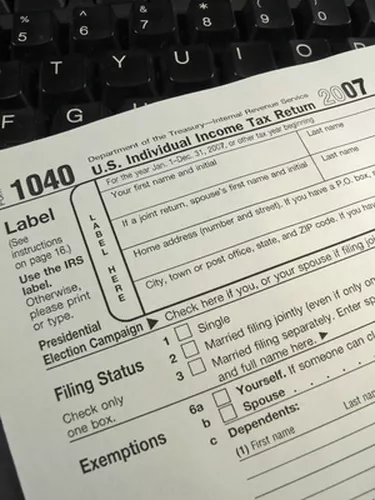
The IRS has no strict rules as to how long taxpayers should keep their tax records, but they do issue guidelines. Taxpayers should keep all tax records related to each tax year until the government no longer has a legal right to collect overdue or unpaid taxes from the taxpayer. The federal tax code has statutes of limitations or timelines in which the IRS must act to collect taxes or lose their right to do so.
Six-Year General Guideline
Video of the Day
The IRS recommends taxpayers keep tax records for at least the three-year period the government has to collect underpaid taxes from taxpayers. Within three years, a tax payer can file amendments to their tax return and the IRS can question your return within that time frame.
Video of the Day
If the IRS selects the taxpayer for an audit, then the IRS tax commissioner can review records for the past three years. Be aware that it may be more than three years before the IRS alerts you to a problem with a previous tax return, so keeping well-organized records is essential.
The IRS may collect additional taxes for six years from taxpayers who have failed to report income exceeding 25 percent of his gross taxable income. Therefore, taxpayers should keep records for at least six years.
Consider also: Tax Audits: What Are They, Why Are You Audited & IRS Audit Outcomes
Exception to Six-Year Retention
For taxpayers claiming investment and brokerage losses of income, then the IRS recommends retaining tax receipts and investment records for at least seven years. There is no statute of limitations deadline for the IRS to pursue tax claims from certain taxpayers. The IRS has no deadline to collect back taxes from taxpayers who have prepared false or fraudulent tax returns.
Additionally, the IRS has an unlimited amount of time to collect taxes from taxpayers who intentionally or inadvertently did not file tax returns for a given year. Taxpayers in these situations should keep records indefinitely.
If your tax affairs are complex, for example, you paid taxes to a foreign government, then you should keep records for 10 years. That's because you can claim a credit on foreign taxes up to 10 years later in some circumstances.
Consider also: What Happens if You Don't File Taxes?
Electronic Records or Cash Receipts
In addition to tax forms and tax returns, taxpayers should keep all records that prove deductions, income and loss on their Form 1040s. These records include employer-generated W-2 statements, self-employment 1099 records and tax forms, investment account records and any other electronic or paper records that can provide substantiation of any investment activity, income or tax deduction.
Employment tax records have a different limitation period. The IRS advises that these records be kept for at least four years after the date that the tax is paid or becomes due, whichever is later.
Consider also: Form 1040: What You Need to Know
State Statutes and IRS Help
Each state has its own revenue or tax department with state statutes that may provide longer limitations' periods than the federal code allows the IRS. Additionally, taxpayers may contact the IRS to request records of tax returns they filed for previous years and any backup attached to that year's return. Taxpayers may obtain the Form 4506 and list the tax years that they are requesting records.